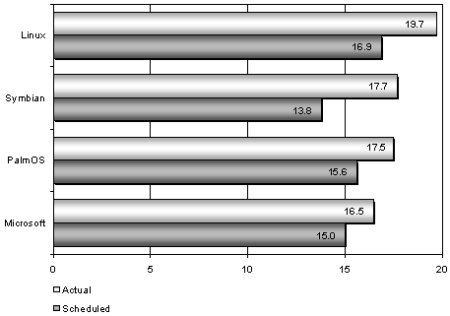VDC: mobile dev times longer, less predictable with Linux
Apr 20, 2005 — by Henry Kingman — from the LinuxDevices Archive — views[Updated Apr. 27, 2005] — Development times for mobile devices are longer and less predictable with Linux than with Symbian, PalmOS, or Microsoft Windows Mobile, recent VDC research suggests. The VDC finding lists a number of factors that it believes drive development times up “for non-Microsoft OSes.”
VDC's findings are based on a survey of over 1,000 global mobile developers, it says, including 157 using Windows, 134 using Symbian, 118 using Linux, and 30 using Palm (the balance use proprietary OSes, RTOSes, RIM, and others, or did not specify an OS).
Among the Linux users, 49 percent reported using freely available, unsupported distributions — a factor that could certainly increase development time compared to using the other commercial OSes in the study. And, the remaining 51 percent may have paid for an inexpensive enterprise distribution, but not for embedded development support.”

Scheduled and actual mobile application development time by OS platform (in weeks). Source: VDC
VDC says the research shows that Microsoft OSes have the shortest and most predictable development times, and that the following factors drive development time up “for non-Microsoft OSes”:
- Developing and porting hardware device drivers
- Software diagnostics, testing, and validation
- Operating system image customization
The first two items may have less applicability to current embedded Linux projects: driver availability is not the issue it once was, and new tools and emerging techniques (such as Virtio's virtualization technologies) are shortening testing and validation times for Linux device development. Thus, operating system image customization probably accounts for the greatest part of any additional development time associated with Linux, since among the OSes compared, it alone comes with free kernel and driver source code.
And, it seems possible that for some mobile device developers, customizability could matter more than time-to-market or launch date predictability. LinuxDevices.com's executive editor, Rick Lehrbaum, explains, “It could be another instance of where less flexibility saves development time/cost; but the companies who can't be constrained to that use Linux instead, to differentiate their products, knowing full well that their development time (and risk) will be greater, but making that investment intentionally.”
Roger Kung, CEO of Linux smartphone startup E28, agreed with Lehrbaum's point during an August, 2004 interview. Kung said, “For Microsoft, the majority of the players are Taiwanese PC manufacturers that follow their PC familiarity with Microsoft. They choose Microsoft's phone package because they have very limited software integration capabilities. They only do the hardware, slapping things together and rushing to market. There are also local Chinese players aiming for the lower tier smartphone market with very, very low performance solutions.”
Asked whether customizability could matter more to some mobile developers than time-to-market, VDC's Krebs replied, “Obviously there are other factors. Whether its macro or micro, there are political factors, whether you want to be a Microsoft shop or a Linux shop. But we wanted to focus on [time-to-market], because so much attention is given to license attributes.”
Krebs added, “On the flipside of Linux's openness, there are limitations such as the lack of a standardized API,” presumably referring to the evaluation burden presented by Linux's rich open source software ecosystem. “It's a question of 'How much flexibility do you really want or need,'” Krebs concluded.
The finding discussed above is from a VDC report entitled “The Mobile Software Stack for Voice, Data, and Converged Handheld Devices: A Global Market Assessment.” The report was sponsored by some 20 companies or organizations. VDC does not disclose the sponsors of its multi-vendor research efforts, Krebs said, declining to elaborate further.
Additional information about the report is available here.
— by LinuxDevices.com senior editor Henry Kingman
This article was originally published on LinuxDevices.com and has been donated to the open source community by QuinStreet Inc. Please visit LinuxToday.com for up-to-date news and articles about Linux and open source.